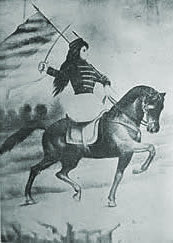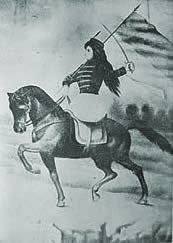
|
Women and Independence in Latin America An exploration of women's involvement in the Latin American Wars of Independence |

|

|
Women and Independence in Latin America An exploration of women's involvement in the Latin American Wars of Independence |

|
Click on one of the images below to see the full-size image
 Buenos Aires, 1834 |
 Fan |
 María Sánchez |
 Tertulia |
 María Sánchez |
Other names: María de Todos los Santos
Gender:Female
Ethnic origen: White
Events:
| 1786 | - | Buenos Aires | - | Not applicable | - | She was born in Buenos Aires on 1 November 1786. |
| 1805 | - | Buenos Aires | - | Unknown | - | She married Martín Thompson on 29 July 1805. |
| 1812 | - | Tucumán | - | Patriot | - | She co-signed a letter here in 1812 offering to buy arms for the independence troops. |
| 1813 | - | Buenos Aires | - | Unknown | - | The national anthem was sung on 14 May 1813 at her tertulia. |
| 1817? | - | United States of America | - | Unknown | - | Her husband, Martin Thomson, died. (Some sources state this was in December 1819.) |
| 1819 | - | Buenos Aires | - | Patriot | - | She married Jean-Baptiste Washington de Mendeville |
| 1823 | - | Buenos Aires | - | Patriot | - | She co-founded the Sociedad de Beneficence with Bernadino Rivadavia |
| 1826 | - | Buenos Aires | - | Patriot | - | She was secretary of the Sociedad de Beneficencia. |
| 1829 | - | Montevideo | - | Patriot | - | She went into exile here. |
| 1829 | - | Montevideo | - | Patriot | - | She held tertulias attended by exiled Porteños. |
| 1839-1840 | - | Montevideo | - | Patriot | - | She wrote a "diario" for Esteban Echeverria from 1839-40. |
| 1846 | - | Rio de Janeiro | - | Patriot | - | She went to Rio de Janeiro in 1846. |
| 1857 | - | Buenos Aires | - | Patriot | - | She was secretary of the Sociedad de Beneficencia. |
| 1868 | - | Buenos Aires | - | Patriot | - | She died on 23 October 1868. |
Connections:
Argentine exiles in UruguayTexts:
0 - In 1812 she was among a group of women who offered to buy weapons and askedfor their names.....
0 - Letter to a friend describing the British occupation of Buenos Aires,1807-1808.
Biography:
She was born in Buenos Aires on 1 November 1786, the daughter of Cecelio Sánchez de Velazco and Magdalena Trillo. She married her cousin, Martín Thompson, on 29 July 1805. She hosted pro-independence tertulias at her home. It was here that the national anthem was sung for the first time on 14 May 1813. (Sosa de Newton, 577-578)
She is described by the Robertson brothers as attending tertulias with Melchora Sarratea and Ana Riglos in Buenos Aires.
In 1804 she wrote to Viceroy Sobremonte to authorise her marriage to Martin Thompson, against her family’s wishes. In her letter she railed against the custom of marriages being arranged by families without consulting the women.
She held a salon in Montevideo through which a network of exiles and Porteños met. The national anthem was first sung there. Her letters reflect her own exile, her economic difficulties, her mother’s and grandmother’s regret at their separation, the administration of goods left in Buenos Aires and the political situation. Sánchez’s letters are conversational in tone, and recreate the atmosphere of the tertulias. She wrote a Diario from Montevideo for Esteban Echeverría who was then in refuge in Buenos Aires (in 1839-40). Her salon distributed news, and the Diario transmitted and analysed political data. Sánchez acted as a spy, relating what was happening around her, reflecting the rumours abounding in Montevideo. “I listen to everyone, and fight with no one”, she wrote to her son, Juan Thompson, who was in exile in Corrientes. She worked with President Rivadavia in the foundation of the Sociedad de Beneficencia, the first institution to protect women and which was run by Buenos Aires women. This was dismantled by Rosas. She established schools for girls in Montevideo. She believed it was essential to educate women if a country is to be civilised. She wrote to her daughter, Florencia, of the joy of loving, and being loved by, a husband. Like Flora Tristán, from the 1830s onwards, she was in favour of the reinstatement of divorce. She wrote to Alberdi, and in 1856 was critical of Sarmiento and Héctor Varela. In 1846 she went to Rio de Janiero. When she returned to Montevideo, she felt restless and wanted to go to Europe, yet said she was tired of travelling and wanted to die in her own home. In 1849 she wrote to Alberdi that she did not feel at home in Buenos Aires, and even after the fall of Rosas, she wasn’t at ease there. In around 1852 she wrote: “Yo nací para ser hombre.” (Arambel Guiñazú, 38-44.)
Born into a upper class family. In 1805, she married Martin Thompson, against her family’s wishes. He was sailor, educated in Europe with strong pro-independence ideas. From her salon, Mariquita collaborated with her husband. Thompson was sent to the US to consult emancipation. He died on the return journey in 1817. Mariquita was left a widow with 5 children. In 1819 she married Washington de Mendeville, a French aristocrat who was French consul in Buenos Aires. She continued to hold tertulias in her house and worked with President Rivadavia organising the Sociedad de Beneficencia founded in 1823, which was concerned with educating girls and opened several schools. Around 1830 Rosas opposed the Sociedad . In 1835 Mendeville was sent back to France. From 1836 onwards, Mariquita spent much time in exile, punctuated by returns to Buenos Aires. She emigrated to Montevideo and stayed for a while in Rio de Janiero. From there she wrote frequently to her children and friends. After Rosas’s defeat, she returned to Buenos Aires and resumed her duties. She died in 1868. (Arambel Guiñazú, 18, 203-204.)
Born 1 November 1786. She had 4 daughters and a son. Her tertulias (held after her marriage to Thompson) were among the most renowned in the Viceroyalty. They were attended by Balbastro, Escalada, Luca, Rubio and Sarratea, also the families of comerciantes. They danced, played cards, listened to music, discussed business, books, religion and politics. Fray Cayetano Rodríguez was also present. The Thompsons were opposed to the Viceroy imposed by the Seville Junta and together with Castelli, Belgrano, Vieytes, los Rodríguez Peña, sought independence. Mariquita’s name appeared in the La Gaceta on 9 de agosto de 1810: “Martín Thompson, capitán de este puerto, ha oblado seis onzas de oro, tres por sí y las tres restantes por su esposa, doña María de los Santos Sánchez”. (Sáenz Quesada, 48-51.)
Sáenz Quesada claims that Thompson died in December 1819 and not 1817 as is quoted. He suffered from depression during his time in the United States and his mental illness caused many relationships to deteriorate. Sánchez married French piano teacher, Jean-Baptiste Washington de Mendeville, in April 1820. It was not a happy marriage, and it ended in separation after 15 years. (Sáenz Quesada, 72-81.)
As Madame Mendeville, Sánchez opened her tertulia to politician and intellectual García del Río, and to the outcast Juan Larrea, who had been exiled by the Argentine Directory in 1816. Sánchez’s home became a focus of music, plastic arts, and welfare work as well as politics. The Mendevilles, other creoles and foreigners supported the Italian teacher, Virgilio Rabaglio’s call for a Philharmonic Society. It was inaugurated on 31 May 1822. The second concert, before a 450+ audience, opened with the National Anthem. Sánchez was friend and protector of many young literary figures such as Vicente López y Planes, Esteban de Luca and Juan Cruz Varela. Her major effort was the Sociedad de Beneficiencia, established in 1823, under President Rivadavia, that marked the State’s (rather than the church’s) responsibility for the care and education of women. Women involved were those close to the government and from circles with high economic and social power. (Sáenz Quesada, 84-90.) Among her pupils was Rosa Guerra who won an award for best pupil in 1826. (Sáenz Quesada, 100.)
Her son, Juan Thompson y Sánchez trained as a lawyer in Europe. He returned to Argentina in 1835 and revitalised Sánchez’s salons. Among his friends who attended them were the “generation of 37” (Sáenz Quesada, 130.)
She greatly admired the writer George Sand (Aurore Dudevant). She was friends with Esteban Echeverría, Alberdi, Juan María Gutierrez, José Mármol, Vicente Fidel López. Pastor Obligado wrote about her marriage to Thompson in his Tradiciones. Sarmiento visited her in 1845, with a letter of introduction from Echeverría (Sáenz Quesada, 14,29,207).
Her letters (1804-1868) and her diary from 1839-1840 were reproduced in 1952. (Knaster, 21)
Many of the men who attended Sastre's salon in Buenos Aires also went to Sánchez's tertulias in Buenos Aires or in Montevideo. (Garrels, 28)
She was a friend of Candelaria Somellera de Espinosa y de Pino. (Sosa de Newton, 612)
In 1812 she was among a group of women who sewed uniforms for the patriot army. Several of these offered to buy weapons and they asked that their names be inscribed on them. Their accompanying note (below) was reproduced in the Gaceta Minist , in June 1812. (Mitre, Obras completas , VII, 16-17)
She appears in Miller's memoirs.
She was also known as María Sánchez (de Mendeville).
She died on 23 October 1868.
She was born in Buenos Aires on 1 November 1786, the daughter of Cecilio Sánchez de Velasco and María Magdalena Trillo. On 27 June 1805 she married Martín Jacobo Thompson, a sailor who fought for the patriots. In 1810 she contributed 3 ounces of gold to the independence cause.
She is attributed to being the secretary of the meeting on 29 May 1812. She was widowed in 1816 and married Washington Mendeville, the French consul in Buenos Aires.
She was founder of the Sociedad de Beneficiencia in 1823, was its president several times and secretary in 1826 and 1857.
She was an inspector of hospitals for women, and of casas de expósitos y dementes. She founded isolation hospitals and schools for girls.
She died on 23 October 1868 aged 82. (Carranza, 98-101)
References:
Nouzeillers, Gabriella, and Montaldo, Graciela (editor). (2002) The Argentine Reader
Arambel Guinazu, Maria Cristina , Martin, Claire Emilie (2001) Las mujeres toman la palabra: Escritura feminina del siglo XIX. Volume: 1
Carranza, Adolfo P. (1910) Patricias argentinas
Davies, Catherine, Brewster, Claire and Owen, Hilary (2006) South American Independence. Gender, Politics, Text
Garrels, Elizabeth (1989) "La nueva Eloisa en América o el ideal de la mujer de la generación de 1837"
Knaster, Meri (1977) Women in Spanish America: An Annotated Bibliography from Pre-Conquest to Contemporary Times
Mitre, Bartolomé (1940) Obras completas de Bartolomé Mitre
Sáenz Quesada, María (1996) Mariquita Sánchez, Vida política y sentimental
Sosa de Newton, Lily (1986) Diccionario biográfico de mujeres argentinas